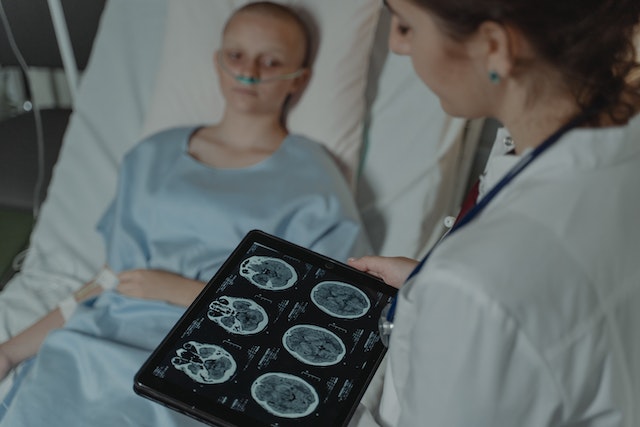A cancer diagnosis is overwhelming, affecting not only a patient’s biology, but also their mental health, psycho-social status, and practical life (e.g., lives of children, career, financial needs). A session at the 2023 Biotechnology Innovation Organization (BIO) International Convention, The Intersection of Cancer & Mental Health: Improving Equity and Access to Quality Care, dug deeper into how patients’ mental health needs can be met through medical, community, and advocacy resources and education.
Patient-centered cancer care

Joseph Greer, Ph.D., Co-Director of Cancer Outcomes Research & Education at the Massachusetts General Hospital Cancer Center, explained, “When patients begin cancer treatment, it is beneficial to see a psychotherapist, but [they] seldom do. It is a new world with a lot of new information, and there is a lack of awareness of how cancer and treatment will affect their lives.” He continued that he feels “fortunate to be a guide and source of support for patients and their relationships, their physical and emotional well-being, and how to cope during the early days following diagnosis.”
Kelly Irwin, M.D., MPH, Director of the Collaborative Care and Community Engagement Program at the Massachusetts General Hospital Cancer Center, discussed the necessity and right of all patients to person-centered care, access to mental health care, and application of precision medicine to identify specific patients and their needs. She went on to explain that “there are groups of people with different vulnerabilities who will struggle more than the average patient.” This includes those with pre-existing mental health disorders. “Rates of depression, anxiety, and suicide are high amongst people with cancer,” she said.
Cancer care delivery has dramatically changed over the past 4 decades, says Maia Thrift-Perry from @BeiGeneGlobal after her panel on #cancer and #mentalhealth with @familyreach and @MGHCancerCenter #BIO2023 pic.twitter.com/YE6Pc8xLy1
— I Am Biotech (@IAmBiotech) June 16, 2023
Integrating mental health in cancer care
The panel, moderated by Maia Thrift-Perry, Global Head of Patient Advocacy and Public Health Policy at BeiGene, USA, Inc., explained the need for the normalization of mental health within the conversation. Patients are trying to make sense of what is happening to them and need a nonjudgmental space to discuss their concerns.

Susan Botegga, chronic lymphocytic leukemia (CLL) Caregiver and Patient Advocate, said, “Patients do not always understand what they are feeling, and their primary focus is often on their families before themselves.” In her advocacy work, she has observed a concerning habit: “The practitioner seems to be focused on treating the cancer and not the patient’s reaction to it.” She stressed the value of communication and discussing the emotions that arise as being an important factor following diagnosis.
Eucharia Borden, Vice President of Programs and Health Equity at Family Reach, emphasized the team approach when it comes to patients and their providers; that patients should be encouraged to do their research but to also bring their questions to their healthcare team to discuss them together. This establishes the relationship between patient and provider.
There continue to be a lot of myths about how we think about cancer, but Greer noted that a healthy way to cope includes having a non-judgmental space to share emotions in an open way. “Having anxiety or sadness following a major health crisis is a normal reaction.”

Irwin spoke about patients who have already gone through prior trauma in their lives and how they may be encouraged to draw from their past experiences to get through this new diagnosis. Borden added that “connectivity of experiences allows patients to realize they have the coping skills to get through another setback.” Family relationships and connectedness to care providers may also be an unexpected but welcome consequence of a cancer diagnosis.
Unique needs during and after care

Irwin added that there are specific time periods that are more difficult than others. “The fatigue associated with radiation, for example, is most common four weeks after completion of treatment.” Normalizing these time periods would benefit the patient’s well-being in addition to supporting their re-entry into a life they once knew.
Community-based mental health treatment is difficult to find, and following cancer treatment, transition to care within the community remains challenging. The panel agreed that a range of support groups (virtual and in-person) need to be organized and may involve collaborations with community-based clinicians to support this need.
Tapping into social media and tech for support
Greer discussed the availability of social media and how it can be used for specific patients as a helpful resource. However, “Patients must be cautioned of the variability of experiences online as well as the harm involved in over-identification with individuals with similar diagnoses, which can be triggering for some.” He emphasized the need to vet patients’ engagement online and to discourage excessive or evening online investigation which may affect sleep and emotional stability.
His team is working on an evidenced-based 1:1 psychotherapy mobile health app that will allow cancer patients to experience and be taught healthy coping styles. There are many possible solutions, including digital support and the future of artificial intelligence. The panel agreed that the more options integrated into clinical care, including collaboration of teams and networks, the better.
Early intervention in research
Based on Greer’s experience, “early intervention of a cancer care team, made up of oncologists, researchers, palliative clinicians, and social workers, helps to normalize the patient’s experience resulting in better outcomes and quality of life.” In patients with an advanced cancer diagnosis, resources are limited wherein the challenge becomes isolating the patients with the greatest need while taking care not to overburden available resources.
Irwin added that early mental health care in patients who have both serious mental illness and cancer have a greater likelihood of receiving the necessary cancer treatment they require. A virtual cancer and mental health equity tumor board has been put together for the purpose of collaboration. This is an evidence-based approach that increases patient access to multi-specialty psychology and oncology expertise. The aim is to collectively care for patients with complex needs while addressing barriers to care.
The mental health of the cancer community is an ongoing concern. Inequity and assumptions within the clinical setting still exist. The panel stressed the need for education of healthcare workers, as well as the integration of advocacy and social workers to provide appropriate, well-rounded care to this unique subset of patients.




